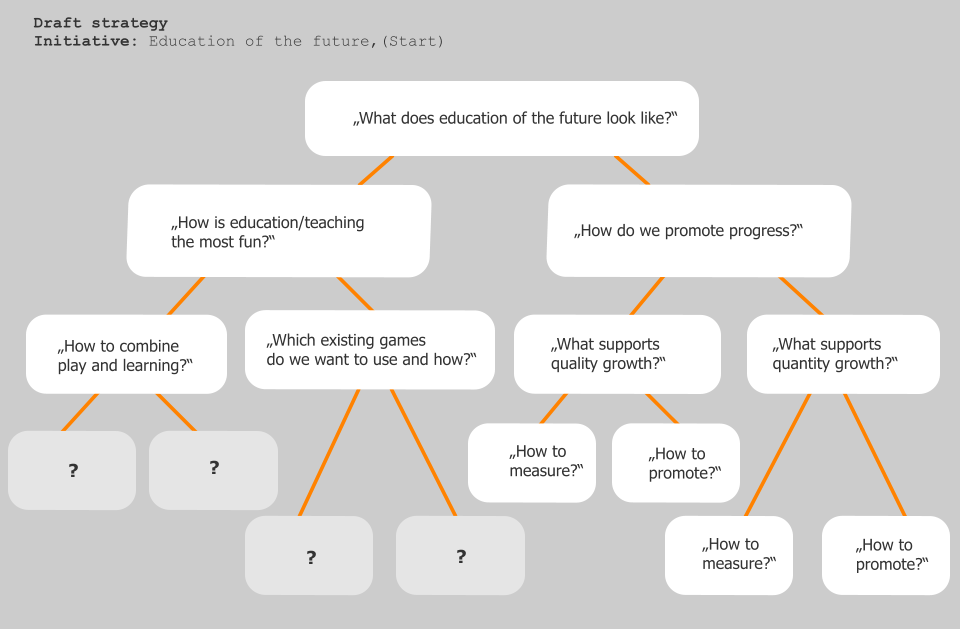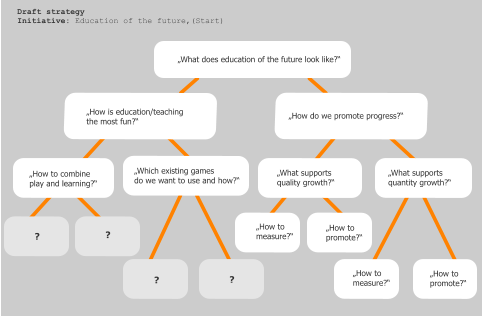



As
long
as
you
have
enough
power
over
people,
you
can
harness
them
for
strategies
that
they
didn't
develop
themselves,
that
don't
suit
them,
and
that
lead
to
results
they
don't
approve
of.
It's
like
a
chess
game.
Someone
thinks
and
moves
his
pieces
around
the
board.
If
today
entrepreneurs
are
upset
that
people
behave
like
wooden
pieces,
don't
think
for
themselves
and
don't
show
any
initiative,
then
it
amay
have
something
to
do
with
the
fact
that
these
people
have
been
standing
around
on
a
chessboard
for
too
long.
What
can
be
done
about
it?
If
you
look
closely
enough,
you
wonder
who
is
still
a
player
at
all
among
all
those
pieces.
And
there
is
another
problem.
In
a
game
that
is
becoming
more
and
more
complex
and
diverse,
the
isolated
strategists
no
longer
have
a
sufficient
overview
of
the
situation
to
be
able
to
build
a
central
control
that
works.
So
a
new
form
of
strategy
is needed that integrates the intelligence of the entire team or community.

Strategic talent
There
are
not
an
excessive
number
of
people
in
a
group
who
have
strategic
talent.
One
might
argue
that,
in
principle,
anyone
who
can
tell
white
from
black
can
play
chess.
To
this
one
may
remark
that,
of
course,
just
about
anyone
can
lose
at
chess.
However,
to
win
at
an
appealing
level
requires
a
suitably
gifted,
trained
and
informed
mind
that
is
comfortable
in
the
abstract
strategic
realms.
Incidentally,
this
is
exactly
how
it
is
with
the
visionaries
of
a
society.
These
people
should
be
identified
and
then
used
for
visioning
and
strategic
planning.
If
a
team
now
wants
to
steer
itself
with
NVC-plus
against
this
background,
the
question
arises
whether
this
is
not
a
contradiction.
Self-direction
and
following
a
strategy
developed
by
someone
else.
To
resolve this paradox, we have developed the NVC-plus strategy.
Dominance strategies
The NVC-plus strategy
The
NVC-plus
strategy
is
intended
to
bring
together
the
capabilities
of
all
in
an
integrative
manner.
At
the
same
time,
however,
everyone
is
to
retain
their
freedom
of
decision
without
deviating
from
the
course
of
the
common
vision.
We
do
this?
Simple.
The
NVC-plus
strategy
consists
only
of
questions,
or
more
precisely,
a
concentric
context
of
questions.
In
the
center
is
the
central
question
to
be
answered
by
everyone's
actions.
e.g.
a
few
people
start
a
new
educational
institute.
What
is
the
central
strategic
question
of
this
institute?
Perhaps
the
strategists
start
with,
"What
does
the
education
of
the
future
look
like?"
Then
the
strategists
consider
that
play
and
learning
are
related,
and
they
ask
the
next
level
question,
"How
do
we
make
education/teaching
the
most
fun?"
Also,
"How
do
we
measure
progress?"
After
that
comes
the
next
level.
There,
a
question
can
be,
"How
does
play
and
learning
connect?"
and
"What
existing
games
do
we
want
to
use and how?" etc.


There
are
as
few
questions
as
possible
and
these
are
laid
out
in
an
order.
The
constant
work
is
now
to
optimize
this
strategy
plan,
especially
to
improve
the
questions,
possibly
to
move
them
to
other
levels
and
to
add
missing
questions.
The
strategists
are
helped
in
this
by
feedback
from
the
field.
In
the
end,
you
have
a
very
small
strategic
question
context
that
is
provided
to
the
practitioners
and
executors.
As
long
as
the
staff
provide
good
"answers"
to
the
questions
with
their
actions,
they
will
always
act
within
the
strategy
without
anyone pushing anything on them. You therefore have guidance without any loss of freedom.



Organising projects with self-organised teams


As
long
as
you
have
enough
power
over
people,
you
can
harness
them
for
strategies
that
they
didn't
develop
themselves,
that
don't
suit
them,
and
that
lead
to
results
they
don't
approve
of.
It's
like
a
chess
game.
Someone
thinks
and
moves
his
pieces
around
the
board.
If
today
entrepreneurs
are
upset
that
people
behave
like
wooden
pieces,
don't
think
for
themselves
and
don't
show
any
initiative,
then
it
amay
have
something
to
do
with
the
fact
that
these
people
have
been
standing
around
on
a
chessboard
for
too
long.
What
can
be
done
about
it?
If
you
look
closely
enough,
you
wonder
who
is
still
a
player
at
all
among
all
those
pieces.
And
there
is
another
problem.
In
a
game
that
is
becoming
more
and
more
complex
and
diverse,
the
isolated
strategists
no
longer
have
a
sufficient
overview
of
the
situation
to
be
able
to
build
a
central
control
that
works.
So
a
new
form
of
strategy
is
needed
that
integrates
the
intelligence of the entire team or community.

Strategic talent
There
are
not
an
excessive
number
of
people
in
a
group
who
have
strategic
talent.
One
might
argue
that,
in
principle,
anyone
who
can
tell
white
from
black
can
play
chess.
To
this
one
may
remark
that,
of
course,
just
about
anyone
can
lose
at
chess.
However,
to
win
at
an
appealing
level
requires
a
suitably
gifted,
trained
and
informed
mind
that
is
comfortable
in
the
abstract
strategic
realms.
Incidentally,
this
is
exactly
how
it
is
with
the
visionaries
of
a
society.
These
people
should
be
identified
and
then
used
for
visioning
and
strategic
planning.
If
a
team
now
wants
to
steer
itself
with
NVC-plus
against
this
background,
the
question
arises
whether
this
is
not
a
contradiction.
Self-
direction
and
following
a
strategy
developed
by
someone
else.
To
resolve
this
paradox,
we
have
developed the NVC-plus strategy.
Die NVC-plus Strategie
The
NVC-plus
strategy
is
intended
to
bring
together
the
capabilities
of
all
in
an
integrative
manner.
At
the
same
time,
however,
everyone
is
to
retain
their
freedom
of
decision
without
deviating
from
the
course
of
the
common
vision.
We
do
this?
Simple.
The
NVC-plus
strategy
consists
only
of
questions,
or
more
precisely,
a
concentric
context
of
questions.
In
the
center
is
the
central
question
to
be
answered
by
everyone's
actions.
e.g.
a
few
people
start
a
new
educational
institute.
What
is
the
central
strategic
question
of
this
institute?
Perhaps
the
strategists
start
with,
"What
does
the
education
of
the
future
look
like?"
Then
the
strategists
consider
that
play
and
learning
are
related,
and
they
ask
the
next
level
question,
"How
do
we
make
education/teaching
the
most
fun?"
Also,
"How
do
we
measure
progress?"
After
that
comes
the
next
level.
There,
a
question
can
be,
"How
does
play
and
learning
connect?"
and
"What
existing
games
do
we
want
to
use
and
how?"
etc.


There
are
as
few
questions
as
possible
and
these
are
laid
out
in
an
order.
The
constant
work
is
now
to
optimize
this
strategy
plan,
especially
to
improve
the
questions,
possibly
to
move
them
to
other
levels
and
to
add
missing
questions.
The
strategists
are
helped
in
this
by
feedback
from
the
field.
In
the
end,
you
have
a
very
small
strategic
question
context
that
is
provided
to
the
practitioners
and
executors.
As
long
as
the
staff
provide
good
"answers"
to
the
questions
with
their
actions,
they
will
always
act
within
the
strategy
without
anyone
pushing
anything
on
them.
You
therefore
have
guidance
without
any
loss
of
freedom.
Dominance strategies



Organising projects with self-organised teams


























